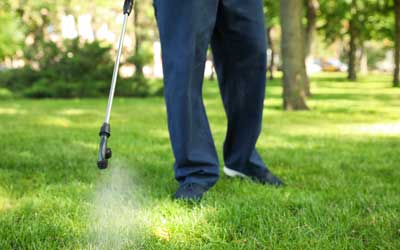Pest Control Clovis Specialists: Protecting Your Family and Home
Wiki Article
Understanding the Different Strategies to Insect Control: A Comprehensive Overview

Natural Insect Control Techniques
Utilizing green strategies such as friend growing and organic bug control is necessary for successfully handling bugs in agricultural settings. Companion growing entails expanding different crops in proximity to deter parasites, boost nutrient uptake, and enhance general crop health. For instance, growing marigolds together with tomatoes can help fend off nematodes. Intercropping maize with legumes can interrupt the reproduction patterns of pests like corn borers.Biological bug control involves presenting natural killers or pathogens to manage pest populaces. Ladybugs, for instance, prey on aphids, managing their numbers without the demand for chemical pesticides. One more instance is the use of Bacillus thuringiensis (Bt), a microorganism that targets specific insect bugs while being safe to people, pets, and advantageous pests.
These eco-friendly techniques not just decrease the dependence on artificial pesticides however additionally help protect biodiversity and soil health and wellness. By including natural insect control approaches into agricultural methods, farmers can attain sustainable insect monitoring while decreasing negative effects on the setting.

Chemical Insect Control Solutions
In enhancement to all-natural parasite control approaches, the utilization of chemical insect control services plays a substantial duty in properly managing pest populations in agricultural environments. Chemical pest control services are formulated to target particular insects that may trigger comprehensive damage to crops. These services typically consist of synthetic pesticides that are developed to eliminate insects rapidly and efficiently.One of the key benefits of chemical parasite control remedies is their performance in managing bug invasions on a large scale. Farmers can use these options utilizing different methods such as spraying, airing out, or seed therapy to safeguard their crops from harmful pests, weeds, and illness. Furthermore, chemical pest control solutions are reasonably simple to apply and can give quick results, helping farmers guard their returns and reduce financial losses.
However, it is necessary to utilize chemical pest control options sensibly to decrease potential adverse impacts on the setting, non-target microorganisms, and human health and wellness. Appropriate application techniques, adherence to safety and security guidelines, and normal monitoring are critical to guarantee the liable use of chemical bug control solutions in farming practices.
Biological Parasite Control Approaches
Organic parasite control comes close to utilize all-natural killers or virus to manage insect populaces in farming setups properly. One usual organic control strategy is the intro of all-natural adversaries, such as ladybugs or parasitical wasps, to target certain parasites.One more biological control approach involves making use of microorganisms like viruses, germs, or fungis to infect and eliminate insects. On the whole, biological bug control approaches use a sustainable and targeted option to pest management in agriculture.
Integrated Pest Administration (IPM)
Integrated Parasite Administration (IPM) is a thorough method that incorporates various pest control methods to effectively handle and decrease pest populations in agricultural systems. IPM concentrates on lasting prevention of insects with a mix of biological, cultural, physical, and chemical control techniques. By incorporating these various approaches, IPM aims to decrease dependence on chemical pesticides, decrease ecological impact, and promote sustainable bug monitoring techniques.
One key aspect of IPM is making use of biological controls such as natural predators, bloodsuckers, and microorganisms to manage parasite populaces. This approach harnesses the power of nature to maintain a balance between insects and their natural opponents without triggering damage to the atmosphere.
Furthermore, IPM includes cultural methods like crop environment, hygiene, and turning control to produce unfavorable conditions for pests and interrupt their life process. Physical controls such as traps, composts, and obstacles are likewise utilized to stop parasite problems.
Physical and mechanical Bug Control Techniques
Utilizing non-chemical approaches, such as physical and mechanical insect control techniques, is a crucial facet of detailed insect management approaches, developing upon the foundation of Integrated Parasite Administration's holistic strategy. Mechanical insect control involves using physical barriers or catches to stop pests from accessing and harming crops or frameworks. This method can consist of techniques like mounting screens on home windows, using row covers in farming, or employing sticky catches to catch pests.Physical pest control approaches, on the other hand, emphasis on directly getting rid of pests with physical methods. Using warm therapies to eliminate bed insects or vacuuming up pests like ants why not try these out or crawlers can be reliable ways to handle problems without the use of chemicals. By integrating these physical and mechanical pest control methods right into an Integrated Parasite Management plan, people and professionals can reduce reliance on chemicals while still efficiently reducing and handling pest populaces damages.
Conclusion

In enhancement to natural parasite control methods, the usage of chemical pest control options plays a significant duty in efficiently managing pest populations in farming atmospheres.One of the key advantages of chemical parasite control options is their effectiveness in managing pest invasions on a huge scale.Integrated Parasite Management (IPM) is a detailed approach that integrates various insect control approaches link to efficiently take care of and minimize pest populations in farming systems.Utilizing non-chemical techniques, such as physical browse this site and mechanical pest control methods, is a critical aspect of detailed parasite management techniques, constructing upon the foundation of Integrated Insect Administration's all natural approach. By incorporating these mechanical and physical bug control strategies into an Integrated Pest Administration strategy, specialists and individuals can reduce reliance on pesticides while still efficiently handling pest populaces and decreasing damage.
Report this wiki page